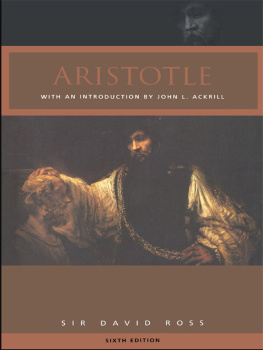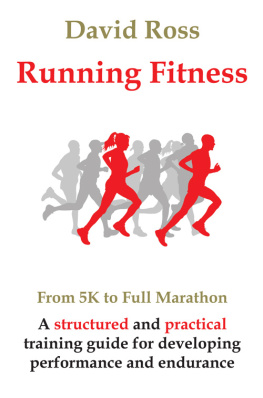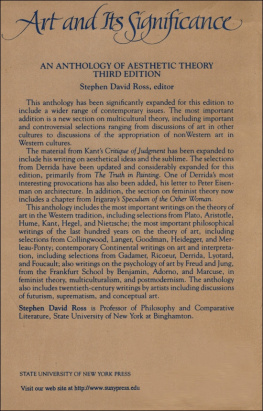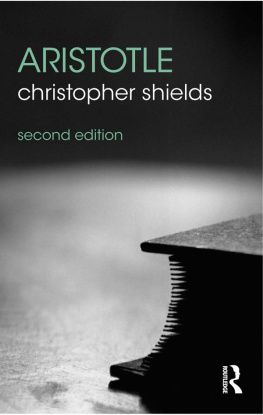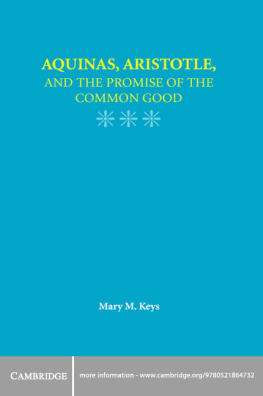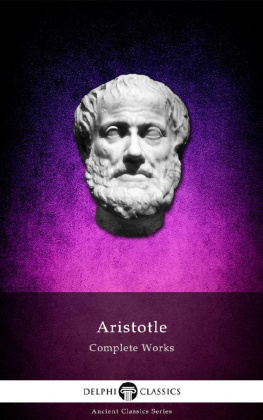Ross Sir David - Aristotle
Here you can read online Ross Sir David - Aristotle full text of the book (entire story) in english for free. Download pdf and epub, get meaning, cover and reviews about this ebook. year: 2011, publisher: Routledge, genre: Science. Description of the work, (preface) as well as reviews are available. Best literature library LitArk.com created for fans of good reading and offers a wide selection of genres:
Romance novel
Science fiction
Adventure
Detective
Science
History
Home and family
Prose
Art
Politics
Computer
Non-fiction
Religion
Business
Children
Humor
Choose a favorite category and find really read worthwhile books. Enjoy immersion in the world of imagination, feel the emotions of the characters or learn something new for yourself, make an fascinating discovery.
- Book:Aristotle
- Author:
- Publisher:Routledge
- Genre:
- Year:2011
- Rating:4 / 5
- Favourites:Add to favourites
- Your mark:
- 80
- 1
- 2
- 3
- 4
- 5
Aristotle: summary, description and annotation
We offer to read an annotation, description, summary or preface (depends on what the author of the book "Aristotle" wrote himself). If you haven't found the necessary information about the book — write in the comments, we will try to find it.
Aristotle — read online for free the complete book (whole text) full work
Below is the text of the book, divided by pages. System saving the place of the last page read, allows you to conveniently read the book "Aristotle" online for free, without having to search again every time where you left off. Put a bookmark, and you can go to the page where you finished reading at any time.
Font size:
Interval:
Bookmark:

Written by reknowned Aristotelian scholar Sir David Ross, this study has long been established as one of the foremost surveys of Aristotles life, work and philosophy.
With John L.Ackrills introduction and updated bibliography, created for the sixth edition, the book continues to serve as a standard guide, both for the student of ancient history and the general reader.
Sir David Ross was Whites Professor of Moral Philosophy and Vice Chancellor of Oxford University.
John L.Ackrill was Professor of the History of Philosophy at the University of Oxford. He has published widely on Aristotle.

First published 1923
Second edition published 1930
Third edition published 1937
Fourth edition published 1945
Fifth edition published 1949
First published as a University Paperback 1964
Reprinted five times by Methuen & Co. Ltd
Sixth edition published 1995
by Routledge
11 New Fetter Lane, London EC4P 4EE
Simultaneously published in the USA and Canada by Routledge
29 West 35th Street, New York, NY 10001
Routledge is an imprint of the Taylor & Francis Group
This edition published in the Taylor & Francis e-Library, 2005.
To purchase your own copy of this or any of Taylor & Francis or Routledges collection of thousands of eBooks please go to www.eBookstore.tandf.co.uk.
1923, 1930, 1937, 1945, 1949, 1964 Sir David Ross
1995 The Estate of Sir David Ross
Introduction and new material 1995 John L.Ackrill
All rights reserved. No part of this book may be reprinted or reproduced or utilised in any form or by any electronic, mechanical, or other means, now known or hereafter invented, including photocopying and recording, or in any information storage or retrieval system, without permission in writing from the publishers.
British Library Cataloguing in Publication Data
A catalogue record for this book is available from the British Library
Library of Congress Cataloguing in Publication Data
A catalog record has been requested
ISBN 0-203-37953-5 Master e-book ISBN
ISBN 0-203-63715-1 (Adobe eReader Format)
ISBN 0-415-32857-8 (Print Edition)
There are several types of book about Aristotle which it would be interesting to write and perhaps not unprofitable to read. In one, it might be shown how almost the whole of his thought is a mosaic of borrowings from his predecessors, and yet is transformed by the force of his genius into a strikingly original system. In another, the attempt might be made to trace the chronological development of his thought; this has recently been done with marked success by Prof. W.Jaeger, in a book to which I should have owed much more had it reached me before mine was in the press. In another, the penetrating influence of Aristotle on subsequent philosophy might be followed down the centuries. I have not attempted any of these tasks, but have tried simply to give an account of the main features of his philosophy as it stands before us in his works. I have written little by way of criticism. If it is true that die Weltgeschichte ist das Weltgericht, it is especially true that the history of philosophy is an implicit criticism of the earlier systems of thought. What is true in Aristotle has become part, and no small part, of the heritage of all educated men; what is false has been gradually rejected, so that explicit criticism is now hardly necessary.
My greatest obligations are to the teachers from whom I have learnt most of what I know about Aristotle, Mr. R.P.Hardie and Prof. J.A.Smith; next to them, I would express my gratitude to Lt.-Col. A.S.L.Farquharson, who has read the proofs and made many valuable suggestions. Of recent books, Prof. H.Maiers Die Syllogistik des Aristoteles, Prof. A.Mansions Introduction la Physique Aristotlicienne, and Prof. H.H.Joachims edition of the De Generatione et Corruptione are those which I have found most helpful. W.D.ROSS
In issuing this revised edition, I wish to express my gratitude to Professor H.H.Joachim, F.B.A., for the full and careful comments on the first edition which he was good enough to send me, as well as to the late Professor W.Rhys Roberts and Mr H.W.B.Joseph for some valuable hints. I hope that this edition has profited considerably by their suggestions and those of various reviewers.
Further corrections have been made in this edition, and I have brought the bibliography up to date. I append (on p. viii), for the convenience of readers, a list of the abbreviations which I have used in this book for the names of Aristotles works.
Further corrections have been made in this edition, and the bibliography has been brought up to date.
The bibliography has again been brought up to date in this edition, and again for its 1953 reprint.
Rosss book gives a concise and comprehensive account of Aristotles philosophical worksand no better account exists. In this Introduction I will say something about Ross and about his book, and I will then outline some of the ways in which the study of Aristotle has developed in the years since he wrote it.
Sir David Ross was born in 1877 and died in 1971. He made his mark in public life and as a university teacher and administrator, and he wrote influential books on ethics. But it is as the leading Aristotelian of the first half of the century that he will be most remembered. In a series of magisterial editions, beginning with that of Metaphysics in 1924, he brought to bear superb scholarship and exceptional sharpness of thought and clarity of expression. He was familiar with the great achievements of nineteenth-century German philology, and he drew from it; but his great strength lay in his intimate knowledge of Aristotles works and in his ability to elucidate the texts and analyse the arguments. There is a refreshing directness in his approach, and an avoidance of pretentions or obscure jargon.
Besides the great editionsof Metaphysics (1924), Physics (1936), Analytics (1949), Parva Naturalia (1955), and De Anima (1961)Ross made excellent translations of Metaphysics and Nicomachean Ethics in the Oxford Aristotle translation series, of which he was General Editor. The book Aristotle was first published in 1923 and has been often reprinted.
The book is a straightforward account of Aristotles works, containing marvellous summaries of difficult theories and complicated arguments, together with brief but suggestive critical comments. It is not an elementary introduction for the absolute beginner: Ross takes for granted some acquaintance with traditional philosophical terminology. There are three types of reader for whom it will be useful. There is the general reader who is interested to know something about Aristotle. He or she will be well advised not to read the book straight through, nor to start at the beginning; the easiest approach would be through the chapters on ethics and politics and then on philosophy of nature. Secondly, the university student will find that a good framework and starting-point for his work on any part of Aristotle will be provided by the reading of the relevant chapter or section of Rosss book. Finally, the professional will read (or re-read) Ross with interest and profit to admire the clarity of the exposition, to evaluate the comments, and to reflect on the ways in which the study of Aristotle has developed since Ross wrote.
Font size:
Interval:
Bookmark:
Similar books «Aristotle»
Look at similar books to Aristotle. We have selected literature similar in name and meaning in the hope of providing readers with more options to find new, interesting, not yet read works.
Discussion, reviews of the book Aristotle and just readers' own opinions. Leave your comments, write what you think about the work, its meaning or the main characters. Specify what exactly you liked and what you didn't like, and why you think so.

